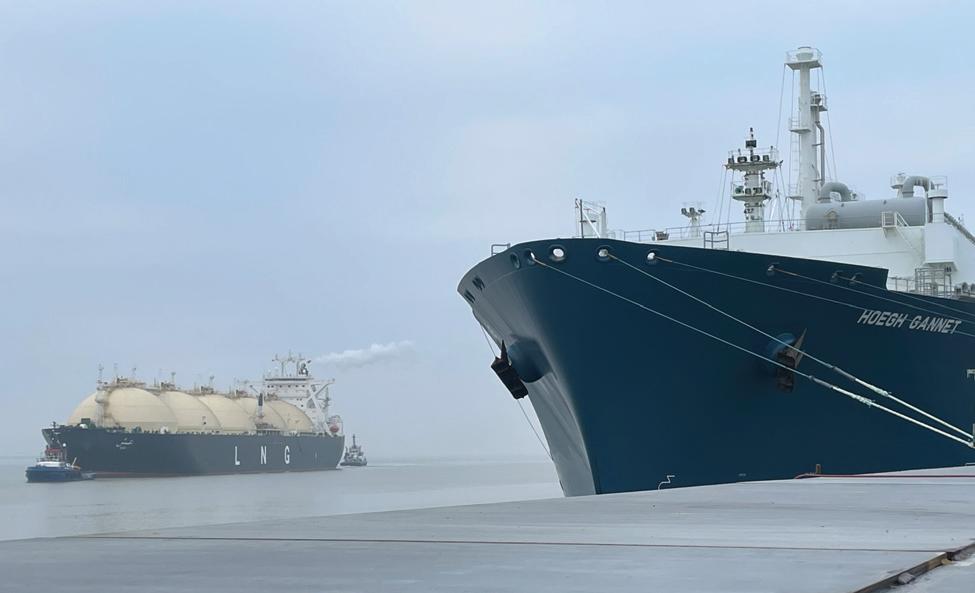
4 minute read
First Middle East LNG cargo to Germany successfully delivered by ADNOC
from OG36
In February, ADNOC delivered of the first shipment of Liquefied Natural Gas (LNG) from Abu Dhabi in the United Arab Emirates (UAE) to the Elbehafen floating LNG terminal in Brunsbüttel, Germany.
Produced by ADNOC Gas at Das Island, Abu Dhabi, the shipment of 137,000m3 of LNG is the commissioning cargo for the new floating LNG terminal in Brunsbüttel and the first-ever LNG cargo to be shipped to Germany from the Middle East. This landmark cargo follows the inaugural ammonia shipment in October 2022, and furthers cooperation on energy security, decarbonisation and lower-carbon fuels between the UAE and Germany.
Advertisement
The cargo delivery to RWE Aktiengesellschaft (RWE) marks an important milestone in developing Germany’s domestic LNG supply infrastructure, supporting the country’s energy security with natural gas. The cargo is sufficient to produce approximately 900 million kilowatt hours of electricity, enough to supply a quarter million German homes for a year.
“After the arrival of the floating terminal in mid-January, the first LNG delivery from the Middle East is the next important step,” said Andree Stracke, Chief Executive Officer, RWE Supply & Trading. “The development of the LNG supply infrastructure in Germany continues to make rapid progress. RWE is providing support wherever we are needed. I am pleased that we have ADNOC as a strong partner and that we are working together to secure Germany's energy supply.”
The UAE-Germany Energy Security and Industry Accelerator (ESIA)
Agreement was signed in September 2022 to accelerate projects of joint interest between the two countries in energy security, decarbonisation and climate action. As part of the agreement, ADNOC entered into an LNG supply agreement with RWE, with further cargos reserved exclusively for German customers in 2023.
ADNOC also entered into a number of agreements with German customers, including Steag GmbH and Aurubis AG for demonstration cargos of low-carbon ammonia, a carrier fuel for hydrogen that can play a critical role in decarbonising hard-to-abate industry sectors. n
Latest innovations from the oil and gas industry
Enteq Technologies qualifies alternative to traditional RSS technology in Norway field trials
Enteq Technologies (Enteq), the energy services technology and equipment supplier accelerating the energy transition through innovative alternatives to traditional technology, has successfully drilled 100m in granite during field trials. This achievement qualifies the SABER Tool’s capabilities as a gamechanging alternative to traditional rotary steerable systems (RSS).
The SABER Tool (Steer-At-Bit Enteq Rotary Tool) is a step change in directional drilling technology, developed by Enteq Technologies and based on a concept created by Shell. The ingenuity of the SABER Tool approach lies in the application of proven technologies in novel ways to achieve a sleek, elegant and mechanically simple design, thereby improving reliability and project uptime versus traditional RSS solutions.
Rather than using pads or plates for steering, the SABER Tool uses an internally directed pressure differential system across the bit face. By removing these external con tact points, the tool reduces wear and improves reliability, while also achieving true at-bit steering for the first time. The sleek, plain collar design also allows for a smoother borehole, further improving reliability, uptime and cost efficiency.
Enteq’s novel solution aims to disrupt the RSS and drilling industry by offering unmatched attributes for operators and service companies, and new levels of performance against the market leaders. By opting to drill 100m in granite, one of the hardest and highest vibration environments for drilling, SABER successfully demonstrated the functionality of key elements of the innovation. During testing, the engineering team was able to identify minor enhancements to the control system, and to ensure that the tool is suitable for use in extreme conditions and non-traditional applications, like geothermal drilling.
With its ability to operate in high pressure and high temperature environments, the SABER Tool is suitable for use in geothermal drilling and methane capture in mining, ideally positioning it to support the energy transition. n
Unity develops first additive manufactured well control component
Unity, Europe’s largest provider of well integrity solutions, is developing a new additive manufactured lightweight gate which can be retrofitted to Xmas Tree gate valves to remediate seal integrity issues in low-pressure wells. The new technology is a result of a collaborative research and development project with Net Zero Technology Centre and Spirit Energy.
The gate has been designed as a solution for late life, depleted and shut-in offshore wells, where the tubing head pressure is too low to effectively seat the gate and seal the well. Unity’s patented design reduces the weight of the gate by around 60%, while retaining its intrinsic strength and would save operators in the region of £250,000 per well by replacing a single surface component rather than the complete well control package.
A full replacement of bespoke, low-pressure wellhead equipment would also require significant downtime, so this new solution offers the opportunity to rapidly remediate the issue and minimise associated production loss.

The UKCS and other regions have many low-pressure brownfield wells, with increasing numbers continuing to enter this phase. The most recent ‘Wells Insight Report’ from the UK’s North Sea Transition Authority, published in October 2022, states that the current active UKCS well stock comprises 2,629 wellbores, of which 1,661 are producing, while the number of shutin wells rose by 65 to 781 in 2021.
Shut in well stock is now at a historical high with 30% of all wells being shut in, with significant intervention on infrastructure cited as one of the top three limiting factors. This is well above the KPI of 10% set by the Wells Task Force and many of these wells might still be valuable if production was restored.
With a patented design, engineered by the team at Unity, the new technology is entering the latter stages of development. Prototype testing has already been completed on a 2-1/16” gate and a 5-1/8” gate is now in manufacture to further prove the concept and qualify the product for commercialisation.
INNOVATION FOCUS
Latest innovations from the oil and gas industry










